#kokichi analysis
Text
For Kokichi, I like that his organization's name is connected to his first name: 小吉 (Small Luck)
A die (singular dice) is literally just a small object whose sole purpose is determined by luck.
#it's a cool little thing#definitely done on purpose right#Kokichi ouma#danganronpa#drv3#drv3 kokichi#kokichi Oma#Ouma kokichi#danganronpa analysis#Kokichi analysis#danganronpa Kokichi#danganronpa v3#danganronpa killing harmony#Winnie talks
63 notes
·
View notes
Text
Also nothing like my usual post, but I couldn't help but think of it.
For those of you that know about Danganronpa, particularly Danganronpa V3, I just had a thought I think might help people understand a character more.
You all know Kokichi Ouma, right? How Kokichi Ouma has a no killing rule in his organization? (Something that is probably important to have when your group mainly goes around committing illegal activities. The longer you do such things, the easier it becomes to do and the lines get more blurred. Which is why the rule probably exists and isn't an unspoken rule but one that's clearly outlined. Because members of the group actually have the potential to do such a thing.)
Well, that doesn't necessarily mean that Kokichi is morally upstanding like some like to make him out to be because all this rule does is ban killing. But everything else is on the table. Another way I just recently thought to put it in-- you know Batman, right? How Batman has a no killing rule? But he'll do everything but kill you? He will send you to the ER and brutally disfigure you if need be, but he won't kill you.
I think that's how people should start looking at Kokichi. Not a pioneer of justice like Batman, but someone who is willing to do everything but kill someone.
(Not that I think Kokichi would send someone to the ER. The fact that I think he was scared of Katio when he punched him makes me think Kokichi just doesn't like violence in general, and has a personal hatred towards the art of killing. But, I think Kokichi would be down for breaking-and-entering, as well as stealing and everything like that. I don't think that would bother him in the slightest.) (Though, Kokichi's seemingly personal hatred to the idea of killing makes me think something may have happened to him, which is a completely different analysis than this one, as such I will not be going into in.
Which, I would like to point out, I also think Kokichi was trying to get everyone killed by Chapter 4. If he figured out they were being watched, he probably figured out they weren't the only people to participate in a killing game, he also probably figured there would be future ones. So to stop the games, he would make it unplayable to the viewers. (In other words, even if he got the rest of his peers killed, they were doomed after the first killing, it was probably better from his perspective to ruin the game and prevent any future games from being held. Saving the future people, instead of his peers basically.) (A choice he and Maki, Kiibo, Shuichi, and Himiko would have ironically shared if that was the case.)
The reason I say this is because I'm frustrated with people making Kokichi this "soft boy" who did no wrong and was only trying to help everyone, or making him a horrible hypocrite with no values. When in truth he's morally grey, was long before he even set foot in the killing game, and was then put in a killing game that would make anyone's morals worse. If anything his actions are an attestment to how much he clung onto those morals and beliefs. (He was far from the only person that's actions that got others killed, and he didn't have the worse motive by far. It shouldn't be swept under the rug, but he shouldn't be automatically worse than every character for his actions just because of a rule he has with his organization. A basic rule that everyone in society has, though it normally doesn't need to be lined out.)
Which, this is just how I view Kokichi, and it may not even be accurate. Just a thought.
#kokichi ouma#drv3#drv3 kokichi#danganronpa drv3#drv3 killing harmony#danganronpa#danganronpa v3#ouma kokichi#kokichi oma#danganronpa kokichi#anaylsis#character analysis#kokichi analysis#kokichi ouma analysis#kokichi oma analysis
30 notes
·
View notes
Text
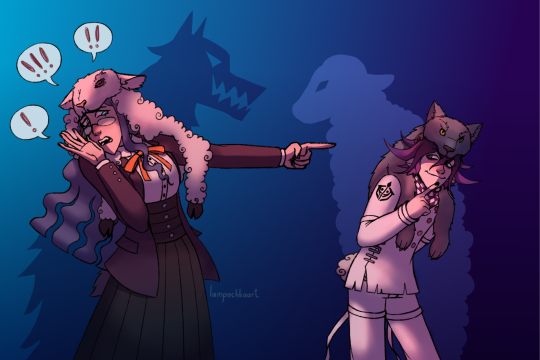
I have been thinking about one interesting thing lately.
I noticed it first during my secong DRV3 walkthrough, but with each rewatching I noticed it more and more.
Tsumugi throws shade at Kokichi SO often, it's insane. Almost from the very beginning of the game, she makes comments about how suspicious Ouma is, or how scary and dangerous he is. She jumps at pretty much every opportunity to point fingers at him and say how bad he is. Now, I wouldn't pay any attention to this if Tsumugi was an ordinary girl. It's much harder to find those who like Kokichi than those who dislike him. But the thing is... Tsumugi is not an ordinary student. She's a mastermind. She is not wary of Kokichi because she believes that he is a potential threat. She deliberately turns the group against him. She knows exactly what she's doing. Every time there is an opportunity to throw shade in his direction, Tsumugi is using it. And in cases where she is not the initiator of the idea, she is one of the first people to agree.
This is a very interesting detail that I have been thinking about for several months now. The more closely you look, the more you notice how often this happens.
I also have been thinking about how Shirogane is literally a wolf in sheep’s clothing, and Ouma, on the contrary, is a sheep in wolf’s clothing. Tsumugi looks and acts like a sheep: nervous, weak, defenseless. But at her core, she is a blood-hungry, ruthless wolf. At the same time, Ouma goes out of his way to be perceived as a wolf. He puts in a lot of effort to be considered scary, dangerous and evil. But in reality, he is just a sheep.
Admittedly, a very weird seep, that was even biting other sheep in order to convince everyone that he was a dangerous predator. But the only thing he has from a wolf is it's hide. Wearing it, however, is risky, because hunters can actually mistake the wearer of this skin for a wolf. Then there just will be one less sheep, and the wolf will remain unnoticed among the herd...
Version with a black sheep Ouma
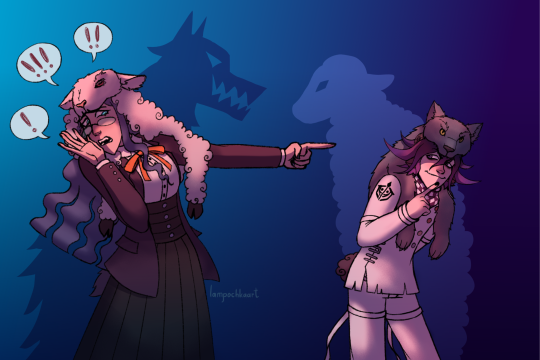
#my art#artists on tumblr#art#danganronpa#danganronpa v3 killing harmony#danganronpa v3#drv3#kokichi ouma#kokichi oma#drv3 kokichi#tsumugi shirogane#drv3 tsumugi#god i love tsumugi#analysis by lampochka#drv3 spoilers#ndrv3 spoilers
2K notes
·
View notes
Text
not enough attention is put towards kokichi's belief in Freedom. i think. because it informs so much of How and Why he is the way he is
he believes that everyone should be free to do whatever they want, as long as they don't take away the freedoms of others. which is why he's so against murder (and like i don't think he Needs an explanation for that because nobody else does. Murder Is Bad. but this is one); because it's the ultimate form of taking someone else's freedom. you can't do anything after death. and by extension the killing game (a game you're forced to play and all that)
i mean there's a moment in chapter 1 where he literally spells it out. there's a fight in the cafeteria and he believes it's their right to argue, so he won't stop them. but it's also completely in kaede's right to try and convince them to stop, so he won't stop her from stopping them.
and that's part of why he likes lies so much too. there's only One Truth. but there's so much more freedom with lies! and why he hates when other people tell him to stop lying, but they lie themselves. that's just hypocritical. he has the freedom to lie, too. that's what i think he means when he starts fake crying when other people lie...he's making fun of them. "i hate liars!!!" said by the liar. he's not actually being hypocritical, or being secretly self-deprecating. he's pointing out their hypocrisy by going "yeah that's what you sound like!!!"
anyway that kinda got off the point um. freedom is a very important thing to kokichi. and i don't think this is realized enough because it explains a lot about him that i see people sometimes complain about it having no explanation
216 notes
·
View notes
Text
So I've noticed that people seem to really misunderstand Maki's dynamic with Kokichi and Korekiyo(separately)...And if anything, People get them confused with each other
The fanon portrayal of Maki and Kokichi's dynamic is that they both hate each other, Kokichi jumps at every chance he has to antagonize her and she hates him enough to jump at any chance to hurt or kill him
The fanon portrayal of Korekiyo and Maki's dynamic is that they're perfectly fine with each other, Especially because of their calm and collected personalities
When it's actually..Kind of completely backwards..
In canon, After Korekiyo finds out Maki's talent; He jumps at any opportunity to antagonize her, Knowing the rules of the game and every other participant protect him from her actually hurting him. And she antagonizes him way more in chapter three even before the murder. He's also blatantly rude to her(Actively ignoring her in conversations and then asking, "Did you say something?" or "Did you hear something?/srs), And Maki is always annoyed with him even being there
Meanwhile in canon with Maki and Kokichi, Even after her talent is revealed she's literally completely fine with him, He antagonizes her for a bit but she is always shown to just not care at all or even at some points responds calmly to him..In chapter 1, She was the only person to agree with him and didn't just assume he was up to no good like literally everyone else did..She only gets more aggressive with him when he says he killed two people for fun and that he was the mastermind. She even felt guilty about killing him even when she still thought he was a remnant of despair(After finding out he wasn't the mastermind)
Am I the only one to find it funny how the fandom got those two dynamics completely confused😭😭
#danganronpa#danganronpa v3#drv3#danganronpa v3 killing harmony#ndrv3#ndrv3 killing harmony#danganronpa ndrv3#dr facts#danganronpa facts#fun facts#facts#random facts#rant post#rant#maki harukawa#drv3 maki#danganronpa maki#drv3 korekiyo#danganronpa korekiyo#korekiyo shinguji#danganronpa kokichi#kokichi oma#drv3 kokichi#kokichi ouma#analysis#character analysis
73 notes
·
View notes
Text
Death Is a Mirror, or How Death Is Linked to the Sense of Self in Jujutsu Kaisen
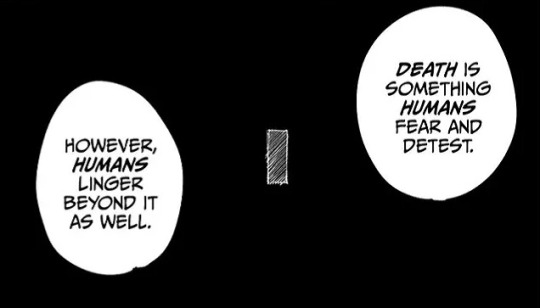
Death is a fulcrum of Jujutsu Kaisen's message, a major point of reference for both the audience and the characters within the story. Death is a mirror that catches and reflects the last light of a life reaching its end, a moment of full disclosure that overcomes all distances and renders all defenses permeable. Death is a mirror as it asks one question: who are we when there's no more need to lie?
The thread that binds together all major characters' deaths in Jujutsu Kaisen is how, despite multiple characters trying in an unreliable-narrator-sort of fashion to convince us otherwise, no one's truly alone in death. The connections that people forge with others throughout their lives become their tethers to the world -- and then reach even further, transcending death itself. This is how humans, using Jogo's words, can still linger after they die: through the loving memory of those they held dear.
No human exists in a vacuum. We live in the context of our relationships with the world, of getting to know and getting to be known in return. Our lives, in a sense, are a dialogue -- that's why we give and are given names. We shape the images of ourselves through establishing connections with others; our self-recognition and sense of self come from recognizing those connections. Once again, we learn the outllines of our souls by bumping into others.
These two concepts, recollecting your 'tethers' before death and acquiring self-reflection in others, are consistently brought together in the story. Before everything else, it's reflected in Yuuji's (who the story's focal point as its protagonist) idea of a meaningful death, one gone surrounded by those you love. Nobara, who possesses arguably the strongest sense of self with her loud proclamation 'I'm Nobara Kugisaki!' and who's highly conscious about her relationships with other people. Megumi, whose overarching struggle for self-determination has him relying on others to define his own worth and leaves him passively suicidal. Toji, who in his last moments thinks about his family and understands that by leaving them behind he deviated from his true self. Nanami, whose fading mind conjures the image of his closest friend and who, guided by that, chooses to go south and stay true to himself. Kokichi is yet another example, and actually quite an interesting one. His character is explored primarily through the juxtaposition between the concept of 'the body within the world' and his forced isolation, but who still contextualizes the world through his connections with his friends. It's no coincidence that Kokichi's character arc is closely linked to Mahito, who is dubbed a mirror of death.
In short, there's a plethora of instances where death and one's sense of self are tied to one another like that. I'll ramble a bit about how this correlation is discovered in both Gojo and Geto's characters below the cut.
The lack of self
Gojo is somebody who's essentially lacking both connections to others and a sense of self-identity. His entire personality is shaped around the notion that he's The Strongest, the very thing which prevents him, even if in his own mind, from building meaningful relationships with the people around him.
Not having to challenge or change his self-image, Gojo has little to no recognition of himself as a person outside of his title. He has never faced a need to discover himself in relation to the world; he was given a foundation to construct his identity on upon birth. Did he really need to grow past that and redefine himself? Satoru lacks self-reflection -- most literally.

With Gojo's face obscured by the gaping void, we do not get to see his reflection. I'd say it's quite an apt visualization of Gojo's identity crisis. Who are you if not The Strongest? As Gojo's position is challenged with his Infinity suddenly overcome, this question is forced onto him.
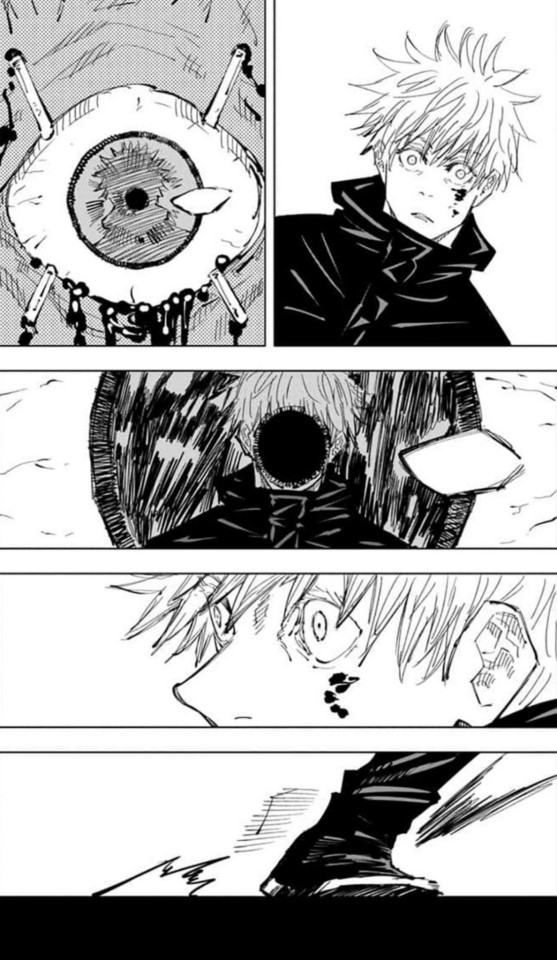
But as he's spent over a decade trying to escape answering it, he never got a chance to acquire a definitive answer. So now, in Shibuya, he flees from it once more.
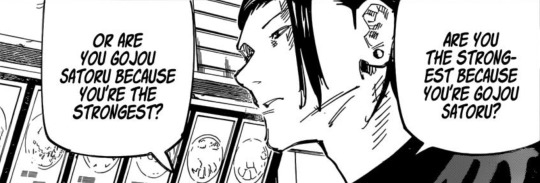
It's painfully ironic and at the same time fully logical that it is Geto who exposes this issue to Satoru as Gojo's sense of self is arguably connected to him more than anyone else. During their student years Suguru was the one who persistently rejected treating Gojo as a title and not a person, who looked through decorum and actively chose to see him not as Gojo Satoru, The Strongest but rather as Gojo Satoru, a teenage boy. For Gojo, it was through Geto recognizing him as a person that he was able to reach that recognition, too.
But after Toji Gojo is forced to seek self-affirmation and validate his ego by reclaiming his position, which was threatened by him losing to somebody for the first time. He tries to reinforce his self-image by separating himself from the world, which ultimately leads not only to his now automatic Infinity rendering him unreachable (= disconnected), but also to a loss of his sense of self as he loses his one and only connection.
As I've already said, with the Prison Realm breaching the defenses of Gojo's technique, this issue, his lack of a firm sense of identity beyond his title, is exposed to him once more. It's reflected in the way Satoru places his priorities post-unsealing. He fights Sukuna with seemingly a single purpose of cementing his position as the strongest sorcerer alive and thus regaining his uderstanding of who he is. The answer to this question has never lain in the plane of strength alone, though, and that is why Satoru fails utterly.
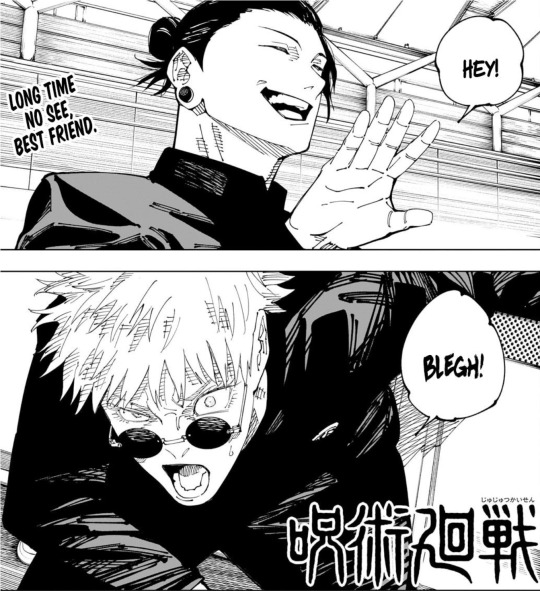
But in death, as the relevance of his Infinity is eliminated, Gojo is finally able to reconnect with his sense of self. He's reverted to his teenage self, to the time he could still relate to somebody on a personal level and get stronger for it. The entirety of the 236 chapter, in a sense, is written as an affirmative: he is The Strongest because he is Satoru Gojo, not the opposite, but it's his death which makes him finally recognize this.
The deviation from self
Now, this image could not be intended as a visual parallel to Gojo's reflection, or lack of thereof, in the Prison Realm's eye. Nonetheless seeing that scene in Shibuya animated immediately reminded me of it, and I think there potentially might be some thematic similarities between the two as well.
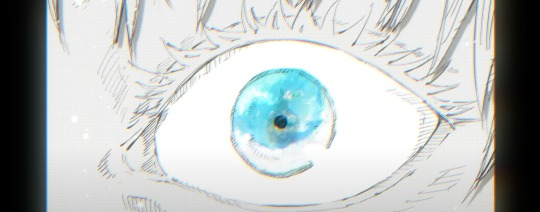
Talking about how our identities are defined by our connections to other people as much as our relationship with ourselves, it'd be only logical to assume that Geto should have a firm grasp on who he is. Not only is he a deeply self-reflective character, but also one who actively relates to others.
However, Geto's reflection in Gojo's eyes is unclear and uncertain, almost indistinguishable. It might be a neat way to convey how, finally taking a moment to look at his best friend for the first time since SPVI, Gojo doesn't really recognize him for how much he's changed. But it also could hint at how Geto, driven to the point where he bends and warps his beliefs to justify his actions, also bends and warps his sense of self.
At least how I see it, the image above calls to mind this panel:

The moment Geto tells Satoru he's decided on 'his true feelings' which would define him as a person. Isn't it ironic how in the exact same conversation he talks about how the goal he's settled upon is only possible for Gojo, meaning striving to achieve it would be akin to trying to become someone he's not? The light novel outright tells us as much:
This was the final confession of a man who could only choose to warp himself, who had erased himself in pursuit of his goals. The only person who could bear such a curse was Gojo Satoru.
In this light it's interesting how Gojo's struggle with his sense of self makes itself known through something which threatens his position as The Strongest, whereas Geto's is reflected in the eyes of someone to whom he refers while saying 'If I could become you...', deviating from himself.
A major factor of overcoming trauma is embracing the inadequacy of what happened. So, to a certain extent, by becoming an enemy to the system Suguru wants to prove the world of jujutsu sorcerers wrong and himself -- right. It once again reminds me of Toji's dying thoughts.
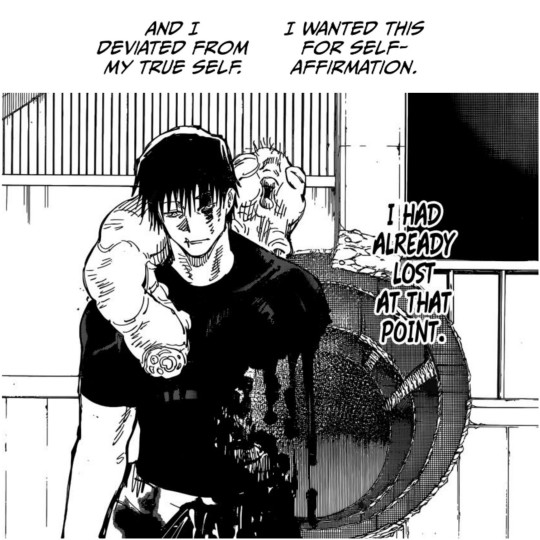
The flip side of 'deciding on your true feelings' is ultimately anchoring your entire identity to what is just a single aspect of it. People exist in motion, and our personalities are in actuality as dynamic and complex as our relationships. But Geto bound his self-definition to what was rather simply a reactive feeling, so in the end he inevitably failed to live up to it.
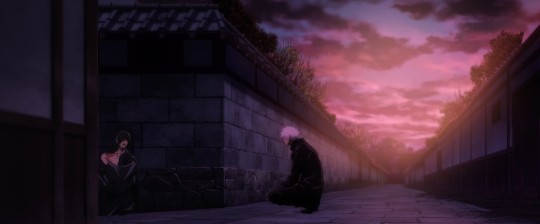
And once again, it's exposed at the moment of Suguru's death. In his case, though, this failure is also what leads to his defeat and consequent death in the first place. I also find it curious how Geto's face is the first thing Gojo sees in the afterlife, while Gojo's face is the last thing Geto sees and acknowledges in his life. And just like Gojo, in his last moments Suguru reminisces about their shared past.
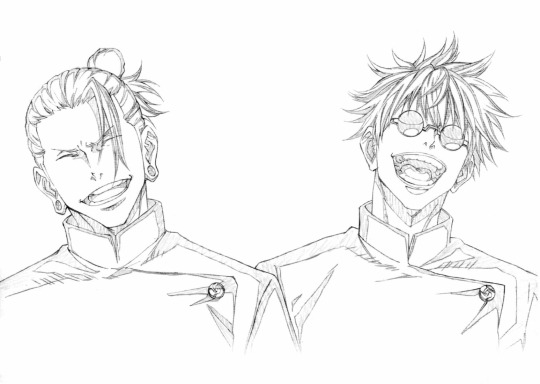
The image almost mirrors what we saw in the chapter 236, suggesting how Geto's true self is in turn tied to Satoru. Despite how vague and uncertain their relationship's come to be, the two are rendered inseperable even in death -- or rather, in death especially.
#jjk#jujutsu kaisen#jjk analysis#jjk meta#god i don't know which characters to tag and in what order#gojo satoru#geto suguru#satosugu#yuuji itadori#nobara kugisaki#megumi fushiguro#toji fushiguro#nanami kento#kokichi muta#mahito#there are too many of them it doesn't feel right to tag them all somehow?#i was trying to keep it short but it obviously got out of hand#*sighs in frustration*#something something you'd say you love me and look in my eyes but i know through mine#you were looking in yours#but not in a derogatory way!#it's all about connections! it's all about tethering! it's about learning who you are through the people around you#we are maps of our experiences and we carry with us everyone we met along the way and let in#that is the gist#jjk manga spoilers#probably should include this tag too#actually not a fan of how pretty much everything i write eventually turns into a satosugu post#but what would you do i guess#*sighs in frustration once more*
249 notes
·
View notes
Photo


That one Barbie Movie meme but Killing Game Busters addition.
#danganronpa#New Danganronpa V3#ndrv3#ouma kokichi#kokichi ouma#gonta gokuhara#killing harmony#ougoku#barbie#barbie movie#gontouma#ndrv3 spoilers#almost done drawing for an ask#after I'll start working on my chp4 analysis thing again probably
434 notes
·
View notes
Text
Rewatching a playthrough of DRV3 and remembering the hours upon HOURS i spent on social media picking apart when Ouma is lying and not with moots & detailing how Saihara's understanding of him progresses throughout the game.....
Like the time after the first trial when Ouma is like "I can't forgive myself for being so USELESS" & Shu's just like "yeah right. Liar" but atp he doesn't know jack or dick about him yet so it's heartbreaking because he dismisses even the possibility of Ouma having any feelings whatsoever and it's so UGHHHH💔✨️
Saiouma my beloved
#character analysis#danganronpa#kokichi ouma#shuichi saihara#🍷i havent heard that name in years...#saiouma#drv3
78 notes
·
View notes
Text
just realize how load bearing the sentence "cause i'm a liar" is to Kokichi's whole character
if you took that sentence out of his dialouge, his entier character would implode. it's like that one random png every other game has that if you remove it from the files the game stops working
you probably think "well no duh" but it's deeper for the character than it sounds.
it's one of the first things he tells you directly, and just the fact that he's the one who says it is a paradox. the liar tells you he's a liar, but the liar lies so is he lying about being a liar? but that would make him a liar right?
that one line is the whole reason the other characters are hostile to him before he even does anything worth getting mad over. he said he's a liar in his introduction, and that will be the first and last thing that he tells them about himself the rest of the cast will truely believe to the end. throughout the game we then see him tell mostly nonsense harmless lies, reminding us after each one that it's okay because he's a lair and nothing that come from his mouth is to be trusted, but when the time comes for the ugly truth to be said- he's the one who delevers it.
he claims to be a liar, makes himself out to be a a liar and bad person with confusing lies that are basically net zero information when you actually think about them, then uses that to lessen the blow when he delevers the truth no one wants to hear- so if they don't want to accept it he can be their plausable deniablity. without the "cause i'm a liar" line none of this could actually work, without him reminding everyone every other minute that "i'm a liar, source: trust me bro" this his whole purpose in the game becomes near impossible to pull off, at least in the way he does in canon.
they might see him as a bad person, or suspect him to be dishonest, but i don't think they'd be able to handle the truth bombs he drops or even fall for his plan without their assurance that he's untrustworth because "after all, he's a liar". sure they could figure out he's lying on their own, but not everyone would come to that conclusion. they'd all be devided on how much they'd be able to trust him, and none would get to be able to let the truths he spits roll off their backs- they'd linger and eat away at their minds.
he would actually be pretty intimidating i think if he acted the exact same way but never called himself a liar at any point. he's this unsettlingly childish guy who talks about world domination casually over tea, and then turns around with a blank expression in a trial and forces you to face the upsetting truth you've been trying to avoid. it'd create a stronger tonal whiplash than he already does in canon, with no saftybars for them to reorintate themselves with.
he's still doing it for the same reasons as canon but the characters around him are having very different and somtimes visceral reactions to his behavior
he'd end up becoming a bit of a truth harbanger in a way
#danganronpa#ndrv3#danganronpa v3#kokichi ouma#character analysis#kai prompts#i think about the canon more deeply than i probably should#despite how importaint that line is to defining his place in the story- i don't think anyone really proceess how integral it truely is#we all kinda take it for granted
53 notes
·
View notes
Text
Oumota Post [Contains Spoilers]
---------------------------------------------------------------
Something I don’t hear talked about enough in relation to Oumota (or just Kokichi and Kaito in general) is the SHEER NUMBER of parallels that they have with eachother, beyond just their narrative roles. Their philosophies of Faith VS Logic and their respective Hero/Villain personas are undoubtably the most interesting part of it, but there’s so much more to be said than just that. Even their physical appearances are designed to contrast. Here's a list of some of the similarities I found.
-------
•Kaito is tall with broad shoulders, while Kokichi is short with a small frame.
•Their hair colours are almost exact opposites on the colour wheel. On top of this, while you don’t really see it due to their respective hairstyles, they both have roughly shoulder-length hair.

•Tying into the previous point, they have very similar colour schemes. They both wear white shirts, and have red, yellow, grey, and white accents scattered around their outfits. They’re also both heavily associated with the colour purple, with Kaito being more aligned with magenta (pink) and Kokichi being more aligned with indigo (blue).
•Kokichi is especially pale compared to the rest of the cast, while Kaito is noticeably tan.
•Kaito’s eyes are upturned, and Kokichi’s are downturned. I’m not sure how to word it but it’s almost like their eyebrows are going in different directions, too.
•They both wear capes that fan out in their splash arts. Kaito’s is a coat, but it has the same effect.
•They’re both bilingual. Kaito can speak English, Japanese, and Russian thanks to his astronaut training, and while it’s unclear why Kokichi can speak multiple languages, we know that he can thanks to his second FTE with Kaede, wherein he says ‘common sense’ in English, Japanese, French, and Spanish. ‘Common sense’ isn’t a commonplace word that new speakers of a language would know, implying some level of fluency.
•In the original Japanese script, Kaito had quite a few homophobic, misogynistic, and transphobic undertones, all seemingly stemming from internalized toxic masculinity. Kokichi was very much the opposite of this (read: not straight), as is discussed in-depth in the trivia section of his Wiki page. [We do not talk about Japanese Kaito in this household].
•Kokichi’s birthday is the 21st, an inversion of Kaito’s birthday, which is the 12th.
•Neither of them portray themselves 100% authentically. Depending on how you read their characters, you could almost argue that deep down, they’re more similar to the other’s persona than they are to their own.
↓
Though he’s often referred to as an idiot due to his stubbornness in the trials, Kaito is actually rather analytical when he so chooses to be, seeing straight through Maki’s lone-wolf act and understanding her needs startlingly fast. He was intelligent enough to pass his astronaut entrance exam (which would’ve involved extremely complicated scientific concepts and a basic understanding of medicine) and has proved himself willing to cheat and lie to get what he wants (i.e, forging an I.D to get early acceptance).
This isn’t the only instance of him lying when it wasn’t strictly necessary, another notable example being the entirety of his Free Time Events; he lies about his impossible summer escapades and brags about how many famous people achieved success because of his influence, seemingly just to boost his own ego and to make himself look more impressive to Saihara. Shuichi internally calls him out for this, more or less verifying that it was all a lie.
He repeatedly lies in the trials (like when he tried to insist that he was the one in women’s underwear in chapter 2), and of course, hid his illness from the others by pretending he was fine, when in actuality, he was on death’s door.
None of this makes Kaito’s passion and kindness any less real, but it’s important to note how he’s not as saintly as he seems. He’s a lot of things, but he’s also an Egotistical Liar, much like Kokichi promotes himself to be.
Moving on to Kokichi, while it’s hard to say with 100% certainty what kind of person he is, we’ve seen him become emotional a number of times throughout the game, most notably in Gonta’s trial. There’s a lot of debate over whether his tears were genuine or not, but the general consensus is that they were. He shows anger here, at both Gonta, the situation, and more likely than not, himself. He clearly feels a lot of shame and grief, but ultimately continues to push on with his plan for everyone else’s sake.
He shows mercy to Yumeno in chapter 3, when he asks her what she was holding back at the end of the trial. This is seemingly done in an attempt to help get her in touch with her feelings, with no obvious ulterior motives or mocking undertones. Him calling her out earlier in the trial can be chocked up to his hatred of hypocrites – as is seen with his overall relationship with the rest of the cast, specifically surrounding how they gang up on him and treat him like a monster for lying when it’s something that they themselves do – but this interaction shows that he sympathises with her, proving that he has some level of empathy.
Kokichi is EXTREMELY selfless, something that’s proven over and over again to the point that if I sat here and tried to list every example, we’d be here until the release of the V3 anime [forever]. He actively plays devil's advocate, knowing that this would lead to the rest of the group disliking him, and his entire plan to end the killing game centred around villainizing himself, all so that he could die to save the rest of the cast. He’s shown to have spent time, likely days upon days, thinking about how to end the killing game – if his room is any indication, he’s poured a lot of toil into making that a reality. Much like with Kaito, none of this changes how Kokichi chose to act – he’s still a bad person who did inexcusable things, but there’s some merit to the fact that beneath all of that, he’s a human being.
In the end, he dies as a Selfless Hero, trying to save a group who he surely must’ve known would feel no gratitude for his sacrifice. He's the exact kind of person that Kaito would approve of, were it not for the other, less pleasant aspects of his personality.
--------
Again this is all just my interrpretation and what do I know but I thought it was interesting so here :3
37 notes
·
View notes
Text
laying face down on the floor wondering if I am not seeing certain characters' relationships to the core themes of the game because I don't appreciate them enough/correctly or if they genuinely aren't super central to the core themes of the game
#shut up me#look as the number 1 gonta fan on this side of the internet#I can admit that wrt overall game's themes relevance... he is NOT high on the list#I truly feel like all v3 characters can easily hold their own in a character analysis essay#but in trying to think and write about the game's overall themes... there are definitely some more important than others#imo Shuichi is central. He's the beating heart of v3#Kaito and kokichi esp as narrative foils are also essential#Kaede and Kiibo are important in a very specific way too#tsumugi too. obv#but I am really worried im missing something with Kaede + Maki + lesser extent himiko#because in looking at my current thoughts on kaede for game relevance.. it has me cringing and truly understanding that she was fridged#and my current thoughts on maki for game relevance are only THROUGH kaito.#And im like. staring into the mirror clutching at the sink.#Can I not see their significance because of misogyny or is it just that the game is like that#Anyway. if you need me i will be pacing circles into the floor thinking about my v3 essay
28 notes
·
View notes
Text

#danganronpa#kokichi ouma#kaito momota#drv3#drv3 spoilers#danganronpa spoilers#drv3 chapter 5#drv3 chapter 5 spoilers#kokichi oma#ouma kokichi#momota kaito#oumota#kaito and kokichi#danganronpa drv3#drv3 kaito#drv3 kokichi#danganronpa v3#v3 spoilers#winnie talks#character analysis#danganronpa analysis
46 notes
·
View notes
Text




Listen, I like Keebo but Kokichi was 100% right to suspect him, especially after this scene. The cast really should have seen the obvious lie here - either the explanation for the Flashback Light is false, or Keebo is pretending it also works on him.
29 notes
·
View notes
Text
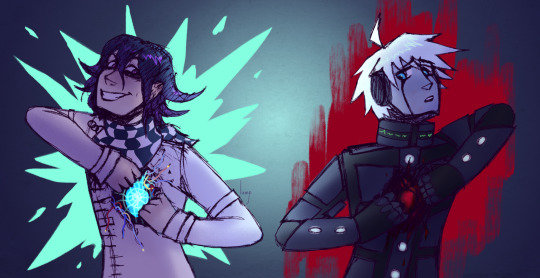
Thinking about how Kiibo tries so hard to be seen as a human and not a robot. He often gets offended when someone reminds him of his characteristics, he tries to avoid using his abilities as much as possible, and he reacts emotionally to the tragic events of the game. He is one of the more soft and sensitive people in the group. And although he is often guided by logic, feelings and emotions still play a big role in his perception.
All the while Kokichi tries really hard to NOT be perceived as a human. Masks sincere emotions behind exaggerated or inappropriate reactions, almost instantly switches between moods, talks about "resetting emotions", tries to distance himself from the group as much as possible, to such an extent that even his dying words are doubted. Many of his actions in the latest part of the game are best described by the word “inhuman.” He is the most cynical person in the group and one of the most cold-blooded ones.
But at the same time, they can't really change who they are. Kiibo has to accept himself and his abilities, which are only avilable to him. And Kokichi can't completely get rid of emotions and force himself not to feel anything, no matter how hard he tries.
#my art#artists on tumblr#art#danganronpa#danganronpa v3 killing harmony#danganronpa v3#drv3#kokichi ouma#kokichi oma#drv3 kokichi#k1 b0#drv3 k1b0#kiibo#drv3 kiibo#keebo#drv3 keebo#i love thinking about this#analysis by lampochka#sure why not
562 notes
·
View notes
Text
having loadssssss of gonta and kokichi thoughts now...obsessed with them The Besties Ever.........
it gets me because their friendship is both about trusting Each Other. and trusting Themselves. like. in those summer camp interactions. it’s gonta repeatedly putting his trust into kokichi. because that’s his Friend. everybody else says that he shouldn’t. kokichi says that he shouldn’t. but gonta trusts him anyway. not because kokichi is tricking him. but because he’s using his own judgment. instead of following what others say about kokichi and what kokichi says about himself he instead looks at him from his own point of view…and comes to his own conclusion to trust him. and i think that is So Sweet. gonta’s a Lot more intelligent than he gives himself credit for!!! his own conclusion—that kokichi ends up always doing something to make people laugh—is accurate!! he can read him well! that’s where the trusting Himself part comes in. because he’s so convinced that he isn’t smart. that other people inherently know better than him. and yet, even when everyone tells him kokichi’s just trouble—he makes his own decision. he has faith in himself to put faith in kokichi. he is confident in this, which i think is so very important for him
they both kinda see something in each other that the others don’t!!! gonta seeing into kokichi’s better intentions where other people wouldn’t, trusting him despite everyone’s insistence that he isn’t trustworthy, including from kokichi himself. kokichi realizing gonta’s intelligence in a way that others don’t, despite others’ and gonta’s own dismissiveness towards that.
like…aughhhh i have so many thoughts but they aren’t entirely coming out into words correctly. kokichi doesn’t think he deserves a friend like gonta, if the utdp graduation event didn’t make that clear. he almost can’t believe someone could like him as genuinely as gonta does, to the point of accusing gonta of lying about being sad to see kokichi gone. and then in summer camp he keeps saying how gonta trusting him worries him. for kokichi it’s about learning to have faith in someone else to know when they want to hold faith in him. about having faith in himself to trust someone else. If that makes sense.
and then in the main game. It’s So Painful. because everything falls apart for them when they don’t have that. gonta had known what the motive video plan was and had agreed to it. but kokichi’s paranoia got the best of him, which led to gonta’s lack of belief in himself getting the best of him, and they didn’t work together again until chapter 4 at which point both of these issues had gotten Worse.
because the whole thing started with gonta now being so caught up in the need to protect everyone else and the belief that that’s all he’s good for. he goes with everyone’s distrust of kokichi and that’s exactly what kokichi uses to get him to do what he wants. while later kokichi becomes distrustful of gonta because during the trial, it seems like gonta is lying, and lying very well. I hope that i explained this in a way that makes sense my brain is foggy right now and i can’t seem to get the Exact Right words out
i just think they’re neat…i loveeeee the existence of the official non-despair AUs because they’re really cool insight. these two could be So Friends. basically i think they’re like this image:
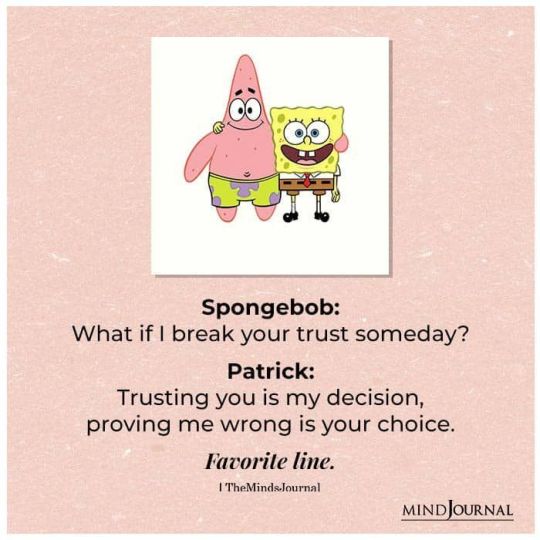
#kokichi ouma#gonta gokuhara#ndrv3#just give them time and they’d be up there among the most iconic best friend duos i swear it#if only this weren’t a murder game…#they’re like wander&sylvia in my Heart ok? they just didn’t go through the development yet#<- words that make sense to only me. i’d ramble about it so much if there was someone else that’d understand a single bit about it#analysis#i think this is enough to fall under that tag#bow rambles
51 notes
·
View notes
Text
so, we agree that kokichi's love hotel is really interesting, right? for saiouma purposes, of course.
in most of the love hotel events, the characters don't act like themselves. they act a bit differently, and on top of that, don't have their actual roles.
but with kokichi's love hotel event...
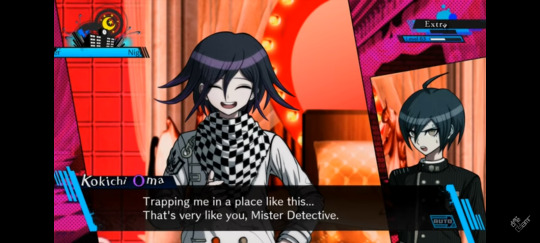


they just act like themselves. shuichi is a detective, kokichi is a sly antagonistic thief. shuichi even says says it himself, "Ah, so I'm not a different person here. I'm me, and Kokichi is Kokichi.

this sets it apart from every other love hotel event.
think about it.

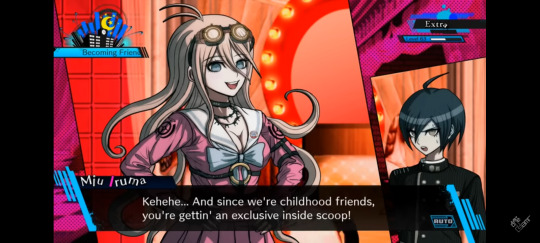




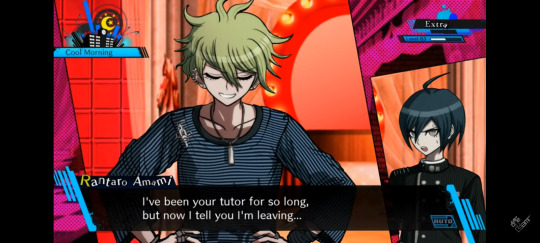
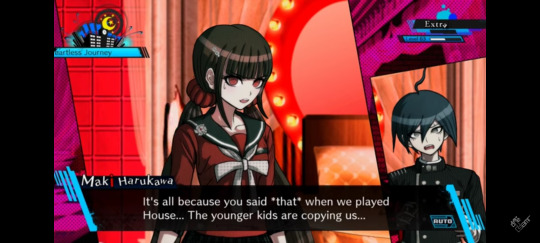
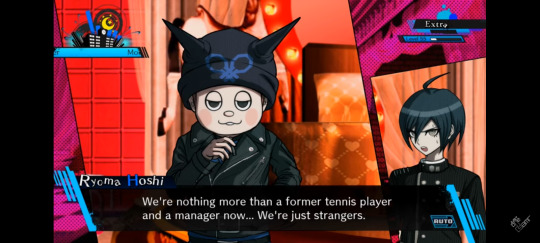



notice how all of them are clearly imagining someone else. kaede is imagining a lover, miu a childhood friend. korekiyo is imagining someone that confessed to him, angie a "lower rank"(presumably something related to worship of atua on her island). gonta is imagining an actor(?), and tenko a fellow user of neo-aikido. rantaro is imagining a student, maki is imagining a fellow person at her orphanage. ryoma is imagining a former manager, himiko is imagining an animal she granted a human form with magic, kaito is imagining a rival pilot, and kirumi is imagining the son of an employer. i'm not even touching tsumugi's event.
now, some of them are more unclear, like kiibo's event. it's implied that shuichi is a close friend, but either way, he's not meant to act like shuichi usually acts.
this is all unlike kokichi's event. if anything, SHUICHI is more in-character during the event than kokichi is, but that makes sense, considering kokichi's character. that's an argument for another day, however.
one other think that's odd about his love hotel event is that kokichi leaves.
in all of the other events, the screen just fades to black with the character sprite still standing there. but with kokichi...
he leaves. after playing around with shuichi a little bit, he turns and leaves. NONE of the others are like this.
now, i think it's worth mentioning what the love hotel events are. the danganronpa wiki states; "The student fully believes in the dream scenario even if it is farfetched, but has no memory of the encounter when they wake up, whereas the protagonist is fully aware that it's a dream, and has some foggy memories of the encounter when they wake up." the reason none of the other people leave is because this is a dream on their part, an ideal. in kokichi's ideal, not only is he toying around with SHUICHI, he leaves him pining and confused, just like he does in-game.
But then again, what do I know? This could be not-canon, and thus not saiouma.
#saiouma#kokichi ouma#mild character analysis warning#danganronpa#drv3#long post#i promised this a while ago but here it is!#shuichi saihara#oumasai
60 notes
·
View notes